DUBAI // Be realistic when looking for your first job and seek out a workplace where you have opportunities to grow.
This is the advice being given to thousands of graduates who will join the job market this month.
Youth unemployment in the Middle East is the highest in the world, more than 25 per cent, and the UAE is not immune.
To create the 100 million jobs required in the region by 2020, experts say a concentrated effort is needed by private companies and governments to change graduates’ expectations and perceptions, and link them to employers early.
“Salaries and packages are probably the most important things on the minds of the students,” said Dr Nabil Ibrahim, chancellor of Abu Dhabi University. “We try to impress on them two things that are more important: the potential for upwards mobility in the company and the potential to grow professionally.”
Dr Ibrahim said students should keep informed about the job market and research the work environment before taking up any position.
“Whether they will be happy does not only involve compensation but the ability to move up or study further,” he said.
Mindsets must change when it comes to job preferences, said Soraya Salti, regional director of the Mena chapter of Injaz Al-Arab, a non-profit organisation that aims to improve youth employability skills.
“There is a huge knowledge gap when it comes to understanding the labour market,” she said. “The youth are making the wrong career decisions, perhaps guided by society or parental pressure.”
She said the draw towards government jobs needed to be addressed first. “In Middle East countries, between 50 and 92 per cent of the youth look for government jobs. They are unaware of what the private sector has to offer.”
For this to change, the private sector needs to be brought to the classroom. “It requires a step-up by corporates, effective campaigns targeting the youth,” Ms Salti said.
Kathryn Taylor, student experience officer at Heriot-Watt University in Dubai, believes the gap between student and employer expectations can be bridged through guidance programmes.
“An increasing number of employers are looking for soft skills such as teamwork, communication, leadership and technical skills,” she said, and graduates must note they may have to start at an entry-level post.
Mariam Sabha, who graduates this month from Abu Dhabi University’s college of business administration, has been hired as a marketing assistant at the university.
“Finding a job has been a challenge because everyone asks for experience,” Ms Sabha said. “The job at the university is not exactly what I was looking for but it is a good start.
“I know the challenges and keeping that in mind, I think for a fresh graduate a salary between Dh5,000 and Dh7,000 in a company that promotes team effort is ideal.”
Nesrine El Hassan, 20, who will graduate from the textiles and design course at Heriot-Watt this year, agreed getting a job was not easy – particularly in her field, which tends to be “very protective”.
“I have sent my CV to a number of places and will be talking to my career adviser about better ways to grab attention.”
[ aahmed@thenational.ae ]






